
|
 |

|
|---|
WILLIAM G. WALKER THE DISEASED PARIAH
– aka William Walker No.3
William G. Walker was a lucky man by any definition of the word. It was shear coincidental luck that had allowed him to rise as fast and as far as he did, BUT by late 1938 his luck had finally run out. It was now becoming obvious to anyone (especially Walker himself), that he would soon be replaced as head of the Calif. Narcotics Bureau; --- And as the below letter shows, he was now looking for some other place to do his evil.
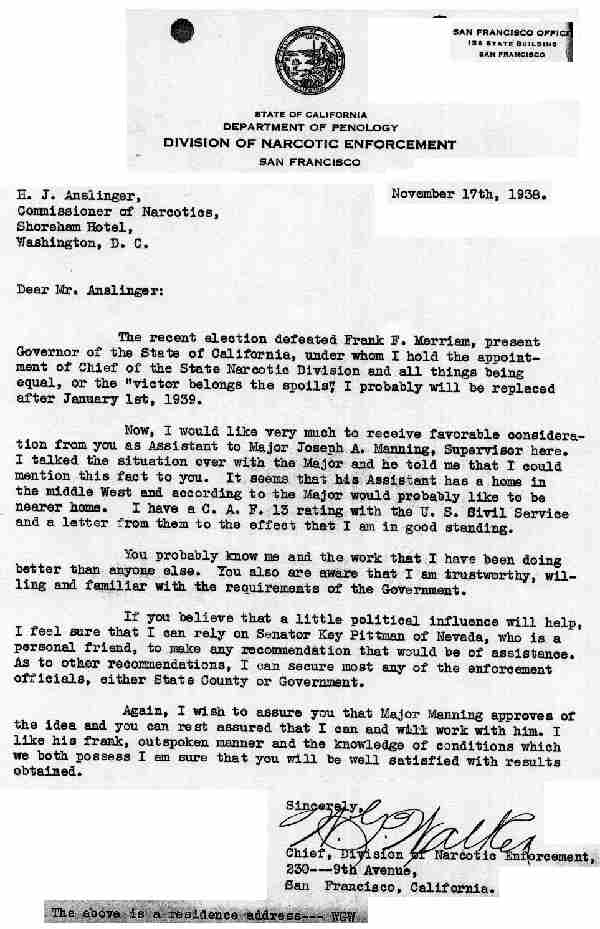
STATE OF CALIFORNIA
DEPARTMENT OF PENOLOGY
DIVISION OF NARCOTIC ENFORCEMENT
San Francisco
Nov. 17, 1938
H.J. ANSLINGER,
Commissioner of Narcotics,
Shoreham Hotel,
Washington, D.C.
Dear Mr. Anslinger:
The recent election defeated Frank F. Merriam, present Governor of the State of California" under whom I hold the appointment of Chief of the State Narcotic Division and all things being equal, or the "victor belongs the spoils”, I probably will be replaced after January 1st, 1939.
Now, I would like very much to receive favorable consideration from you as Assistant to Major Joseph A. Manning, Supervisor here. I talked the situation over with the Major and he told me that I could mention this fact to you. It seems that his Assistant has a home in the middle West and according to the Major would probably like to be nearer home. I have a C. A. F. 13 rating with the U.S. Civil Service and a letter from them to the effect that I am in good standing.
You probably know me and the work that I have been doing better than anyone else. You also are aware that I am trustworthy, willing and familiar with the requirements of the Government.
If you believe that a little political influence will help, I feel sure that I can rely on Senator Key Pittman of Nevada, who is a personal friend, to make any recommendation that would be of assistance. As to other recommendations, I can secure most any of the enforcement officials, either State, County or Government.
Again, I wish to assure you that Major Manning approves of the idea and you can rest assured that I can and will work with him. I like his frank, outspoken manner and the knowledge of conditions which we both possess I am sure that you will be well satisfied with results obtained.
Sincerely,
/s/ W. G. walker
Chief, Division of Narcotic Enforcement
230 - 9th Avenue,
San Francisco, California.
The above is a residence address --WGW
A request that actually seems to have been given some consideration by Harry Anslinger (head of the Federal Bureau of Narcotics) at the time. But (as will also be shown) that consideration didn’t last very long.
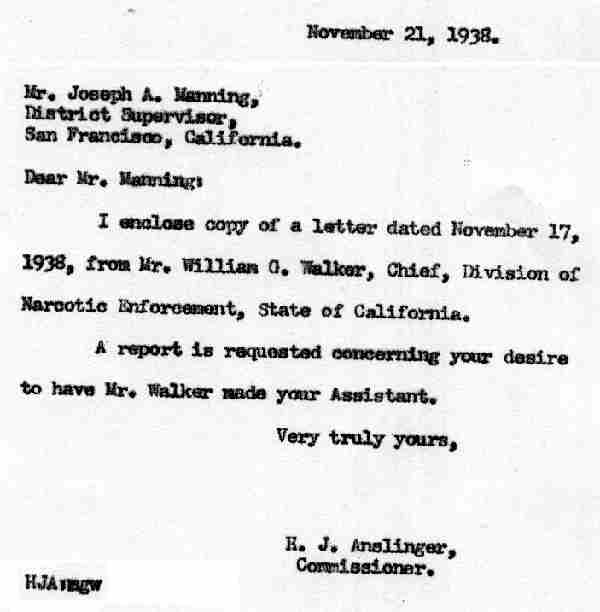
Nov 21, 1938
Mr. Joseph A. Manning,
District Supervisor,
San Francisco, California.
Dear Mr. Manning:
I enclose copy of a letter dated November 17, 1938, from Mr. William G. Walker, Chief, Division of Narcotics Enforcement, State of California.
A report is requested concerning your desire to have Mr. Walker made your Assistant.
Very truly yours,
H.J. Anslinger,
Commissioner.
HJA:mgw
However, as can be seen from this "CONFIDENTIAL" reply letter, it would appear that Walkers past antics did NOT hold him in good standing. And the last thing that the local Federal Chief wanted was to bring him on board.
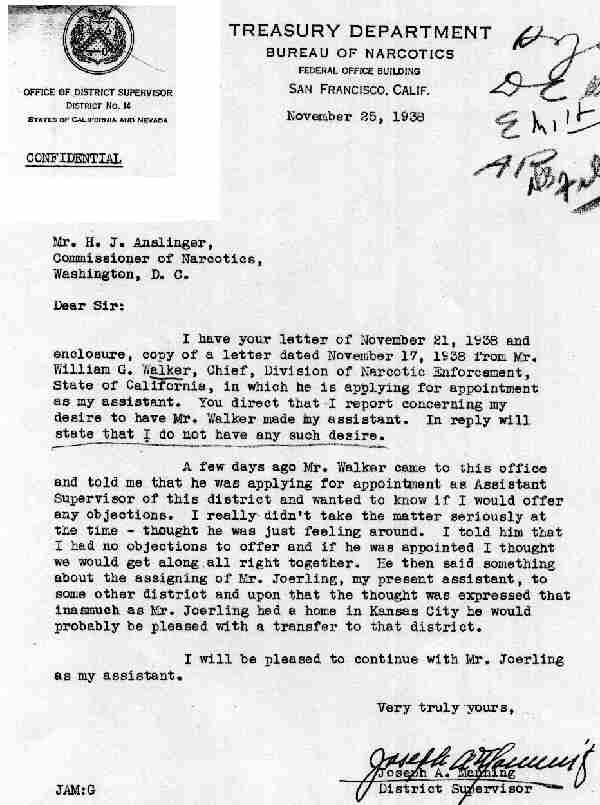
TREASURY DEPARTMENT
BUREAU OF NARCOTICS
Federal Office Building
San Francisco, Calif.
Nov. 25, 1938
Office of District supervisor
District No. 14
State of California and Nevada
CONFIDENTIAL
Mr. H. J. Anslinger,
Commissioner of Narcotics,
Washington, D. C.
Dear Sir:
I have your letter of November 21, 1938 and enclosure, copy of a letter dated November 17, 1938 from William G. Walker, Chief, Division of Narcotic Enforcement, State of California, in which he is applying for appointment as my assistant. You direct that I report concerning my desire to have Mr. Walker made my assistant. In reply will state that I do not have any such desire.
A few days ago Mr. Walker came to this office and told me that he was applying for appointment as Assistant Supervisor of this district and wanted to know if I would offer any objections. I really-didn't take the matter seriously at the time - thought he was just feeling around. I told him that I had no objections to offer and if he was appointed I thought we would get along all right together. He then said something about the assigning of Mr. Joerling, my present assistant, to some other district and upon that the thought was expressed that inasmuch as Mr. Joerling had a home in Kansas City he would probably be pleased with a transfer to that district.
I will be pleased to continue with Mr. Joerling as my assistant.
Very truly yours,
(signed)
Joseph A. Manning
District Supervisor
JAM:G
HOWEVER, Walker wasn’t the one to take no for an answer and as the Joker (Batman Comic Books) would say; “If you have to go, GO WITH A SMILE”. And boy, did Walker go with a bang. Actually quite a few of them.
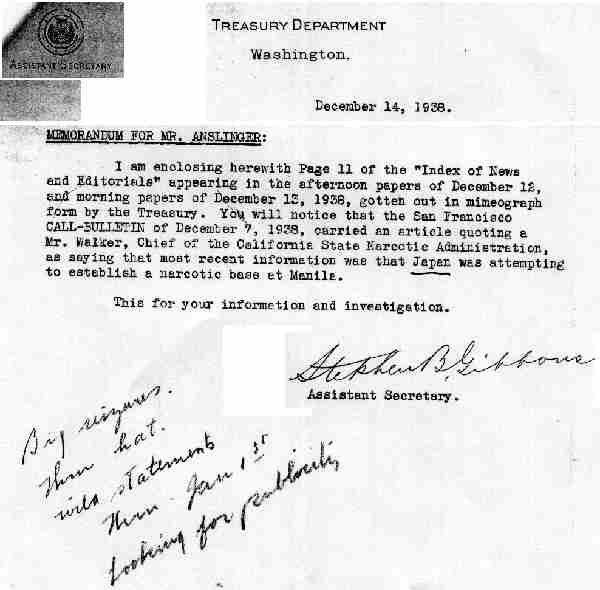
TREASURY DEPARTMENT
Washington
December 14, 1938
MEMORANDUM FOR MR. ANSLINGER:
I am enclosing herewith Page 11 of the "Index of News and Editorials" appearing in the afternoon papers of December 12, and-morning papers of December 13, 1938, gotten out in mimeograph form by the Treasury. You will notice that the San Francisco CALL-BULLETIN of December 7, 1938, carried an article quoting a Mr. Walker, Chief of' the California State Narcotic Administration, as saying that most recent information was that Japan was attempting to establish a narcotic base at Manila.
This for your information and investigation.
(signed)
Assistant Secretary.
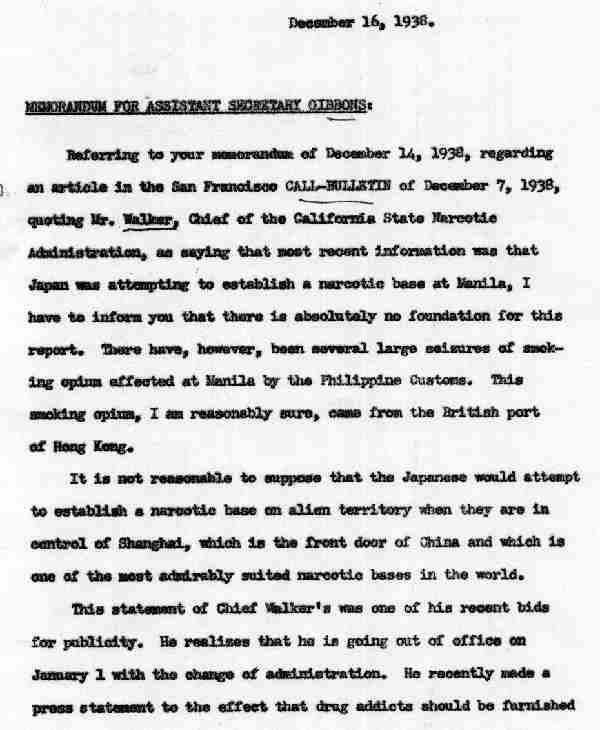
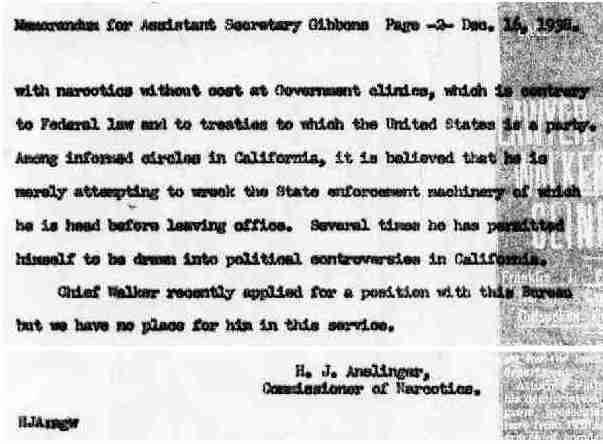
Dec. 16, 1938
MEMORANDUM FOR ASSISTANT SECRETARY GIBBONS:
Referring to your memorandum of Dec. 14, 1938, regarding an article in the San Francisco CALL-BULLETIN of December 7, 1938, quoting Mr. Walker, chief of the California state Narcotic Administration, as saying that most recent information was that Japan was attempting to establish a narcotic base at Manila, I have to inform you that there is absolutely no foundation for this report. There have, however, been several large seizures of smoking opium effected at Manila by the Philippine Customs. This smoking opium, I am reasonably sure, came from the British port of Hong Kong.
It is not reasonable to suppose that the Japanese would attempt to establish a narcotic base on alien territory when they are in control of Shanghai, which is the front door to China and which is one of the most admirably suited narcotic bases in the world.
This statement of Chief Walker’s was one of his recent bids for publicity. He realizes that he is going out of office on January 1 with the change of administration. He recently made a press statement to the effect that drug addicts should be furnished with narcotics without cost at Government clinics, which is contrary to Federal law and to treaties to which the United States is a part. Among informed circles in California, it is believed that he is merely attempting to wreck the State enforcement machinery of which he is head before leaving office. Several times he has permitted himself to be drawn into political controversies in California.
Chief Walker recently applied for a position with this Bureau but we have no place for him in this service.
H.J. Anslinger,
Commissioner of Narcotics,
HJA:_gw

AND talk about a BANG, can you imagine the HEAD NARC calling for decriminalization -- Read on.
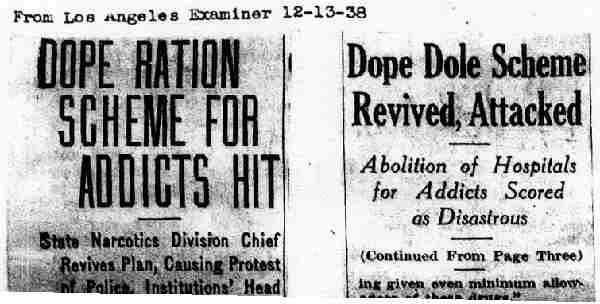
Los Angeles Examiner 12-13-38
DOPE RATION SCHEME FOR ADDICTS HIT
State Narcotics Division chief Revives Plan, Causing Protest of Police, Institutions’ Head
Prior Trial of Method Proved Disastrous in Los Angeles, says Capt. Edward Chitwood
Reviving an issue which was killed six years ago under an avalanche of medical, legislative and civic protest, aided by vigorous illumination of the facts by vigorous illumination of the facts by California Hearst newspapers, William Walker, chief of the State Narcotics division, has launched a new move to abolish the state’s narcotic hospitals.
The same opposition that arose almost spontaneously in 1932 when the same “economy” move was suggested was rising again yesterday – spurred on particularly by a second suggestion by Walker that as a substitute for hospitals, addicts be given “dope rations” by some governmental agency.
PLAN CONDEMNED
“no!” PROTESTED Captain Edward Chitwood, chief of the city police narcotic bureau. “We tried that ‘dope ration’ business right here in Los Angeles ten or 12 years ago. “The result? Dope fiends flocked here to got free dope?
“And that wasn’t all: addicts simply enjoyed an increased supply, became in addition to what many could get from physicians and illegal vendors, they were sure of the steady supply given out through the clinics. The experiment was abandoned as a miserable failure, and no officer in his right mind, would who has ever had experience with drug addicts would ever want to try it again.
“The state hospital at Spadra does give an addict hope of a cure. If you guarantee him a Government subsidized ration, when will he ever be cured?”
One of the nation’s greatest alienists, Dr. Aaron J. Rossanoff, soon to become state director of institutions, was just as emphatic that the way to cure an addict is certainly not to give him morphine and heroin in daily specified “ration.”
WOULD STOP CURES
“I am absolutely opposed to giving these drugs to addicts,” he said. “Cures are possible in a small percentage of cases when you have the best of expert attention and care, but no one is going to be cured by being given even minimum allowances of these drugs.”
Doctor Rosanoff, who does not take office as director of institutions until after the first of the year, said he had no official information as to the value of the hospital at Spardra, and so would not comment on whether or not this and other narcotic hospitals should be abolished.
“It has been suggested informally that the Government might be induced to establish a narcotic hospital on the Coast,” he said. “This might be one way to reduce the expense on the state of narcotic treatments.”
To Walker’s statement that “narcotics addiction is incurable” --- one of his reasons for wanting to stop the state’s work through special hospitals --- records at Sparda Hospital, near Pomona, stand in direct refutation . . . and the record these were made under the worst possible conditions.
17 PER CENT CURED
For the past 10 years, about 17 per cent of the Spardra cases have been cured---and none, opponents of Walker’s amazing proposal point out, would be cured if addicts were given a certain and sure supply through dispensaries and clinics, as he suggests.
The 17 per cent, however, came from the worst possible type of cases---criminals, addicts of many years’ standing, persons who never had home disciplinary training and were, therefore, too weak morally even to aid the efforts to help them.
One institution executive suggested that many patients who could be helped at Spardra are not sent there, but go to private institutions.
“With the average run of addicts, instead of the type sent to Spardra,” said this official, “the record for cures would run much higher.”
Doctor Ronsanoff said this was “undoubtedly true.”
The basis of Walker’s campaign, which so far has included a radio address and a recommendation to Governor-elect. Olson, was not apparent yesterday. In his radio address he said:
“Marihuana is not the principal menace in California from a narcotic standpoint.”
Los Angeles Examiner 12-17-1938
LAWYER HITS WALKER DOPE CLINIC PLAN
Franklin J. Potter, Former Narcotic Case Prosecutor, Outspoken in Denunciation
Emphatic opposition to the “public narcotic clinic” idea advanced by W.G. Walker, chief of the State division of Narcotic Law Enforcement, was expressed here yesterday by Attorney Franklin J. Potter; former counsel for the local branch of that department.
Attorney Potter, outspoken in his denunciation of Walker’s program, prosecuted narcotic cases here from 1930 to 1932, obtaining scores of convictions.
WON ACCLAIM
Later he was with the city Attorney’s office for three years, assigned to prosecuting misdemeanor narcotic cases, in which he won widespread acclaim for his many convictions against traffickers in narcotics.
“The plan advocated by Mr. Walker is the most treacherous thing that could happen to narcotic law enforcement in California,” declared Potter. “We should not give up advances made in curbing this problem.
“Assuming that we have not met with the success desired in curing addicts, there is no reason to give up trying.
“In the past there were those who said such fatal maladies as appendicitis, typhoid, yellow fever and smallpox could not be cured---that anyone stricken with those diseases was a sure goner.
“I will go so far as to say that Spadra has not been the success we would like to have it, but addicts confined there, at a low cost of $30 a month, are kept from committing crimes against society that would cost hundreds of times that amount.
“This most certainly is not the time to surrender in our efforts to curb this scourge.
“Prosecution of “big shot peddlers” and unethical physicians long has been hampered by those who advocate public clinics for addicts. . . [more]
WALKERS EPITAPH:
Did Walker really believe (toward the end of his carrier) in what we would now term, “Harm Reduction”? The answer (as this museum sees it) IS NO!
Leaving aside the fact that he was a natural born liar, just examine the facts for yourself. Throughout his whole career, first as a prohibition agent and then as a narc; Walker, he did nothing more than ruin the lives of others. How many (otherwise law abiding) citizens did he put in jail. How many lives did he ruin (felony convictions etc), in his personal quest for power, etc. . . Granted, one can always say that he was “Just doing his Job.” But the same can be said about a lot of Hitler’s boys too.
In addition, note that his (so called) conversion, occurred only during his very last days, and only under very questionable conditions. Also note that if he truly felt that way about prohibition verses crime reduction, why didn’t he take up the subject AFTERWARDS?
To the best of our knowledge, he didn’t even so much as give a public speech about the matter – right up until the day he died. YET NOTHING. Which leads us to believe that it was simply a parting shot, a last bit of grandstanding on his part.
“May God Have Mercy on his Soul”
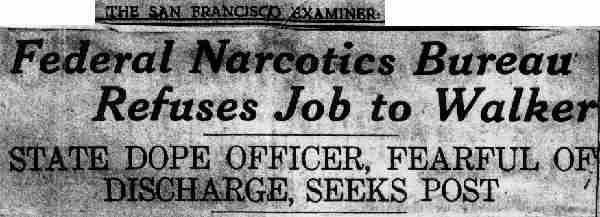
NOTE: All photos doctored for quicker download speeds and transcribe errors are possible. If needed feel free to contact the museum for original copies.

|
Wm. G. WALKER BACK |
|---|
WANT TO KNOW MORE:
=====================
Due to space / download time considerations, only selected materials are displayed. If you would like to obtain more information, feel free to contact the museum. All our material is available (at cost) on CD-Rom format.
CONTACT PAGE
CALIFORNIA  MAIN INDEX PAGE |